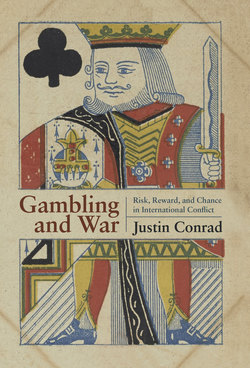Описание книги
In 1914, as Germany mobilized for war, Chancellor Theobald von Bethmann-Hollweg remarked to the country’s legislators, “If the iron dice must roll, then God help us.” War has often been compared to a game of dice or a lottery. But just as frequently, war has been compared to a game of pure strategy like chess. Napoleon’s shocking successes during the early years of the Napoleonic Wars, for instance, are often attributed to strategic superiority and his ability to see the conflict in the same way a player sees the pieces on a chess board.
In reality, the business of negotiating with adversaries, fighting wars, and ending wars is far more complicated than a game of chess where each player can see all the pieces on the board and knows the possible paths that they can take. Even a casual observer of history can see that war is far more chaotic and unpredictable. And yet, international bargaining and international conflict is not a simple dice game either, where human beings have no control over the outcome. A comprehensive analysis of why wars occur and how they are fought must take into account a variety of factors including strategy, human error and dumb luck.
And perhaps no game in human history better captures these elements than the game of poker. Indeed, Prussian military theorist Carl von Clausewitz remarked that “war most closely resembles a game of cards.” To succeed in poker, it is not enough to simply anticipate the actions of other players and try to outsmart them. A successful player must also have an understanding of, and a healthy appreciation for, the role of randomness. Additionally, players must confront the reality that all human beings are prone to errors in judgment, which causes them to make suboptimal choices under many circumstances. Taken together, all of these challenges make poker a fascinating and highly unpredictable game, explaining its enduring popularity.
This book focuses on applying lessons learned from poker, blackjack, roulette and other games of chance to study of international conflict. The book demonstrates how the combined factors of strategy, psychology and probability influence the outbreak of wars, how they are fought, and why they end. Drawing on scholarly insights from a variety of fields, including probability, statistics, political science, psychology and economics, the book offers thoughts on how we can better manage and prevent international conflict, the costliest game of all.
In reality, the business of negotiating with adversaries, fighting wars, and ending wars is far more complicated than a game of chess where each player can see all the pieces on the board and knows the possible paths that they can take. Even a casual observer of history can see that war is far more chaotic and unpredictable. And yet, international bargaining and international conflict is not a simple dice game either, where human beings have no control over the outcome. A comprehensive analysis of why wars occur and how they are fought must take into account a variety of factors including strategy, human error and dumb luck.
And perhaps no game in human history better captures these elements than the game of poker. Indeed, Prussian military theorist Carl von Clausewitz remarked that “war most closely resembles a game of cards.” To succeed in poker, it is not enough to simply anticipate the actions of other players and try to outsmart them. A successful player must also have an understanding of, and a healthy appreciation for, the role of randomness. Additionally, players must confront the reality that all human beings are prone to errors in judgment, which causes them to make suboptimal choices under many circumstances. Taken together, all of these challenges make poker a fascinating and highly unpredictable game, explaining its enduring popularity.
This book focuses on applying lessons learned from poker, blackjack, roulette and other games of chance to study of international conflict. The book demonstrates how the combined factors of strategy, psychology and probability influence the outbreak of wars, how they are fought, and why they end. Drawing on scholarly insights from a variety of fields, including probability, statistics, political science, psychology and economics, the book offers thoughts on how we can better manage and prevent international conflict, the costliest game of all.
